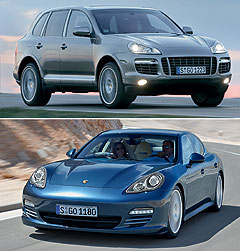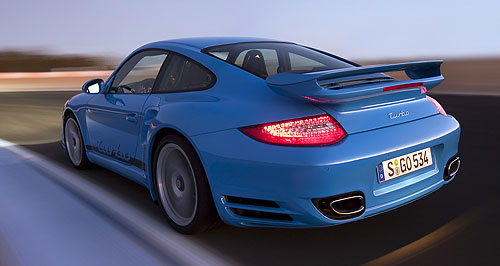Make / Model Search
Future models - Porsche - 911Porsche rules out hybrid 911 for five yearsNot yet: Porsche says hybrid powertrains have a long way to go before they are good enough for its purebreds. Next-gen 911 will be launched with iconic flat-six, says Porsche20 Oct 2009 By JAMES STANFORD in PORTUGAL THE next-generation Porsche 911 will not include a hybrid powertrain when it is introduced in 2011. While Porsche raised the possibility of a 911 hybrid at September’s Frankfurt motor show, company chief engineer Dr Erhard Mossle told GoAuto at this week’s international launch of the updated 911 Turbo that any such car would be at least five years away, if it happened. Porsche will introduce a hybrid Cayenne next year and follow with a hybrid Panamera, but it is clear that issues would need to be overcome before a 911 hybrid is built. Dr Mossle said packaging and increased weight were two major issues that would need to be solved. While a hybrid 911 is still a fair way off, a fully electric 911 is much further away, despite the early success of cars such as the Tesla Roadster. Dr Mossle suggested 10 to 15 years was a realistic timeframe for an all electric 911. “It would need to be able to deliver a range of 300km, in a sporty driving manner,” he said. “We need the battery technology first and then it has to be the right price.”  Left: Porsche Cayenne, and below Porsche Panamera. Left: Porsche Cayenne, and below Porsche Panamera.Dr Mossle said Porsche, which was recently absorbed into the giant Volkswagen Group, was having ‘an open discussion’ about future low emission powertrains, and Porsche may be able to take advantage of some of the electrification technology. He said whatever solution was proposed, it would have to deliver the kind of performance that customers expected of a 911. For his part, rally legend and senior Porsche test driver Walter Rohrl is not a supporter of electric technology. Asked for his opinion on the prospect of hybrid 911, Rohrl said: “At the moment I can’t believe it (would happen). Maybe one day it will change.” The two-time World Rally Champion says electric assistance was not the best solution for better fuel efficiency. “I believe the best way is smaller turbocharged engines,” he said. The 998-generation 911 is under development, with working prototypes powered by a six-cylinder rear-mounted engine. Dr Mossle said his engineers were working on several improvements for the petrol engine which were expected to drive down consumption, helped by a range of weight-saving initiatives. He pointed to the new 911 Turbo engine as a good example of being able to save fuel and increase performance, with savings of up to 16 per cent thanks to a range of initiatives including direct injection and a new dual-clutch automatic transmission. Although the engine is 200cc larger than the one it replaces, the new 911 Turbo powerplant is also 5kg lighter. Dr Mossle would not rule out introducing idle-stop technology, which turns off the engine at idle to save fuel, for the new 911. He said he did not know of any decision to downsize the engine, which is currently 3.6-litres for the standard car and 3.8-litres for most higher-performance versions, and ruled out a switch to four-cylinders for now. “Our engine is already much smaller than the competition,” he said.  All future models Alfa Romeo Alfa Romeo Abarth Abarth Alpine Alpine Alpina Alpina Audi Audi Aston Martin Aston Martin BMW BMW Bentley Bentley Chery Chery Brabham Brabham Chrysler Chrysler Chevrolet Chevrolet Cupra Cupra Citroen Citroen DS DS Dodge Dodge Fiat Fiat Ferrari Ferrari Foton Foton Ford Ford Great Wall Great Wall FPV FPV Haval Haval GWM GWM Honda Honda Holden Holden Hummer Hummer HSV HSV Infiniti Infiniti Hyundai Hyundai Jaguar Jaguar Isuzu Isuzu Kia Kia Jeep Jeep Land Rover Land Rover Lamborghini Lamborghini Lexus Lexus LDV LDV Mahindra Mahindra Lotus Lotus Mazda Mazda Maserati Maserati Mercedes-AMG Mercedes-AMG McLaren McLaren MG MG Mercedes-Benz Mercedes-Benz Mitsubishi Mitsubishi Mini Mini Opel Opel Nissan Nissan Peugeot Peugeot Pagani Pagani Proton Proton Porsche Porsche Renault Renault Ram Ram Rover Rover Rolls-Royce Rolls-Royce Skoda Skoda Saab Saab SsangYong SsangYong Smart Smart Suzuki Suzuki Subaru Subaru Toyota Toyota Tesla Tesla Volvo Volvo911 pricing
Motor industry news |
Click to sharePorsche modelsAll future models Alfa Romeo Alfa Romeo Abarth Abarth Alpine Alpine Alpina Alpina Audi Audi Aston Martin Aston Martin BMW BMW Bentley Bentley Chery Chery Brabham Brabham Chrysler Chrysler Chevrolet Chevrolet Cupra Cupra Citroen Citroen DS DS Dodge Dodge Fiat Fiat Ferrari Ferrari Foton Foton Ford Ford Great Wall Great Wall FPV FPV Haval Haval GWM GWM Honda Honda Holden Holden Hummer Hummer HSV HSV Infiniti Infiniti Hyundai Hyundai Jaguar Jaguar Isuzu Isuzu Kia Kia Jeep Jeep Land Rover Land Rover Lamborghini Lamborghini Lexus Lexus LDV LDV Mahindra Mahindra Lotus Lotus Mazda Mazda Maserati Maserati Mercedes-AMG Mercedes-AMG McLaren McLaren MG MG Mercedes-Benz Mercedes-Benz Mitsubishi Mitsubishi Mini Mini Opel Opel Nissan Nissan Peugeot Peugeot Pagani Pagani Proton Proton Porsche Porsche Renault Renault Ram Ram Rover Rover Rolls-Royce Rolls-Royce Skoda Skoda Saab Saab SsangYong SsangYong Smart Smart Suzuki Suzuki Subaru Subaru Toyota Toyota Tesla Tesla Volvo Volvo911 pricing
Motor industry news |









Facebook Twitter Instagram